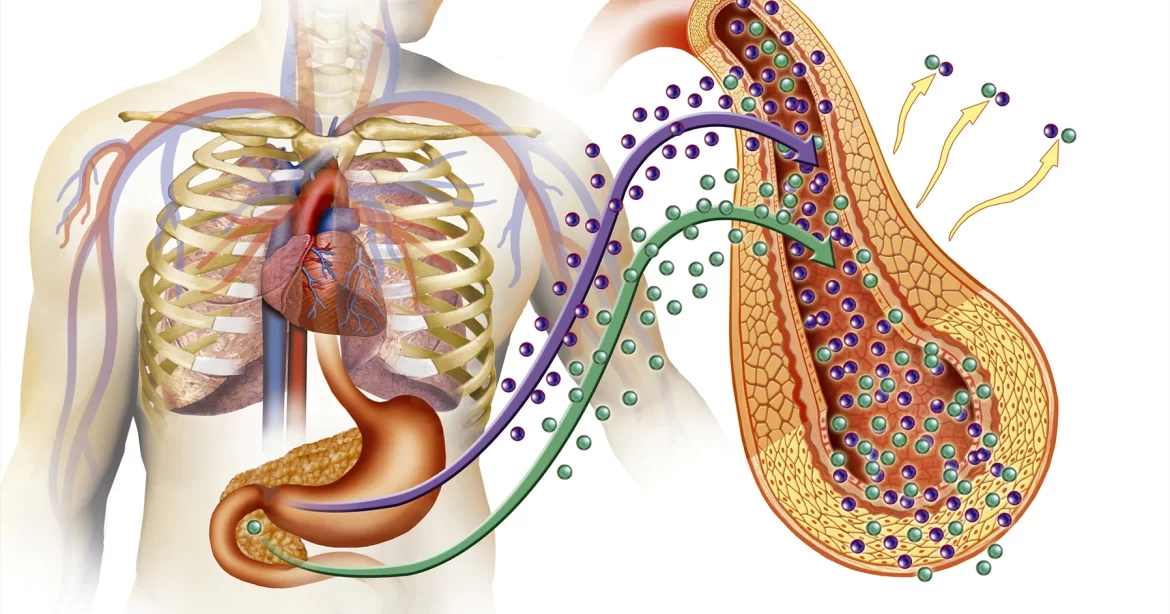Diabetes can first injure the kidneys (diabetic nephropathy) and then ultimately trigger complete kidney failure. The majority of patients in the US with ESRD have diabetes, and diabetes is the most common risk factor for chronic kidney disease and ESRD. In fact, half of all patients entering kidney failure are doing so as a direct result of diabetes.
When blood glucose levels are elevated, the tiny blood vessels, called glomeruli, that supply the kidney are damaged, and albumin leaks into the urine. This is called proteinuria.
High Blood Sugar
Blood sugar tends to be high in people with diabetes, and this, over time, leads kidneys to be harmed. Kidneys filter blood, removing waste products from it, and balancing the electrolytes and fluid of your body. These jobs are performed by the kidnals filtering. Elevated blood sugar can interfere with the nerves that tell your bladder when it’s full, setting up a cascade of likely increased but infrequent urges to urinate. With each bout, your kidneys are strained, cannabis urinalysis test kit metres away from your bladder, sitting with a full bag of urine (unfortunately not fit for consumption) for too long, the risk of infection or worse rises. Elevated blood glucose in diabetes and high blood pressure (hypertension) can both cause kidney disease as a result of damage to the tiny blood vessels that supply kidneys with oxygenated blood. Systolic blood pressure under 130 mmHg, and diastolic blood pressure at 80 mmHg or lower can reduce this risk greatly, particularly in individuals living with diabetes.
High Blood Pressure
Keys to a satisfying life and to steering clear of complications such as high blood pressure, which can occur in diabetes, include keeping your blood sugar under control. When you have high blood pressure, your kidneys can’t filter your blood as well, which can result in too many waste products that build up in your system (a condition known as diabetic nephropathy). Regular screening for microalbuminuria, which is a small amount of albumin showing up in the urine, can help diagnose this condition. Along with reducing blood pressure, a sodium-, potassium- and phosphorus-restricted diet also helps to maintain the integrity of the kidneys. Your healthcare team can tailor an optimal plan to your unique history and to your goals for blood sugar and blood pressure. Carefully guided antihypertensive drug therapy, such as with angiotensin-converting enzyme (ACE) inhibitors and angiotensin receptor blockers, the recently approved sodium-glucose cotransporter-2 (SGLT-2) inhibitors, a low sodium diet, and effective antihypertensive medicine together help slow the progression of and provide symptomatic relief from kidney disease.
Kidney Complications
Kidney disease is a common complication of diabetes. People with the condition are at much higher risk compared with people who don’t, suffering permanent damage to their kidneys as a result of a combination of high blood glucose levels damaging microscopic blood vessels within the organs or blood pressure elevating to unhealthy levels that increases the risk of end-stage renal disease (ESRD), when all four of a person’s kidneys shut down. Previously high, normalising blood glucose and blood pressure, together with antihypertensive drugs, may be able to slow further progression of the kidney disease; and microalbuminuria levels and estimated glomerular filtration rate estimates (look these up) can be repeatedly assessed through screening. In type 1 diabetes, the pain may be because of damage to the nerves that transmit information from the bladder to the brain when the bladder is full, making it feel overly full and on the streets stretching the journal was published . There was increased pressure on the kidneys, which in diabetes damaged by high glucose levels and makes them more prone to complications. There are drugs that can help with inflammation, such as nonsteroidal anti-inflammatory drugs (NSAIDs); while other medicines, including phenoxyazine derivatives like methyldopa and chlorpromazine, renin-angiotensin antagonists, such as angiotensin converting enzyme (ACE) inhibitors or angiotensin receptor blockers, sulfasalazine and glucocorticoids may prevent or delay the complications.
Kidney Failure
The kidneys are shrouded in blood vessels, with pores so tiny, only a million or so could fit inside a inch. Inside the kidneys, there are millions of microscopic filters, called nephrons, which can be damaged by high blood-sugar (glucose), leading to diabetic nephropathy – kidney disease. This means that damaged nephrons lose the capacity to secrete the hormone renin, which helps maintain blood pressure and fluid balance. Concurrently, blood pressure in the kidneys starts to rise, causing a risk for cardiovascular disease as well as for nerve damage. Kidney failure, or end-stage kidney disease, is the last stage of diabetes, which can be fatal if not treated and must be dialysed or have an organ transplant. Serious diabetes complications can be prevented or delayed with a healthy lifestyle of eating a nutritious diet, physical activity, not using nonsteroidal anti-inflammatory drugs (NSAIDS) such as ibuprofen or naproxen, and taking the doctor’s advice on regular check-ups and tests. Keeping the blood sugar and blood pressure under control and taking your prescribed medications (ACE inhibitors or ARBs) on time are important steps to prevent the onset of kidney disease in those with diabetes.


